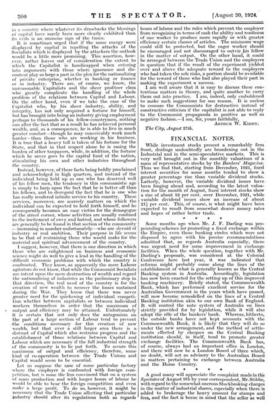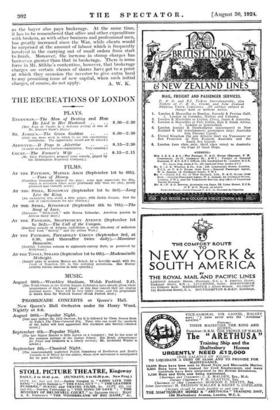FINANCIAL NOTES.
While investment stocks present a remarkably firm front, dealings undoubtedly are broadening out in the Industrial and in the semi-speculative markets. This is very well brought out in the monthly valuations of -a. mass of representative stocks by the Bankers' Magazine. Thus we find that, starting from December, 1921, fixed interest securities for some months tended to show a greater percentage rise than variable dividend stocks. Latterly, however, the variable dividend issues have been forging ahead and, according to the latest valua- tion for the month of August, fixed interest stocks show a rise of about 13 per cent. over December, 1921, while variable dividend• issues show an increase of about 21i per cent. This; of course, is what might have been expected to result from somewhat dearer money rates and hopes of rather better trade.
Some months ago when Mr. J. F. Darling was pro.: pounding schemes for promoting a fixed exchange within the Empire, even those banking circles which were not disposed to agree with his precise recommendations admitted that, as regards Australia especially, there was urgent need for some improvement in exchange facilities. When the whole question, together with Mr. Darling's proposals, was considered at the Colonial Conference here last year, it was indicated that reforms might probably come along the lines of the establishment of what is generally known as the Central Banking system in Australia. Accordingly, legislation has now been enacted for the setting up of this improved banking machinery. Briefly stated, the Commonwealth Bank, which has performed excellent service for the Australian Government in the years which have passed, will now become remodelled on the lines of a Central Banking institution akin to our own Bank of England. It will control the note system of Australia on lines strictly provided for by legislation, while it will also adopt the role • of the bankers' bank. Whereas, hitherto, the outside banks have not kept accounts with the Commonwealth Bank, it is likely that they will do so under the new arrangement, and the method of settle- ments effected by cheques on the Central Banking institution should, in itself, tend to promote greater• exchange facilities. The Commonwealth Bank has, of course, always had an important office in London, and there will now be a London Board of three which, no doubt, will act as advisory to the Australian Board in matters pertaining to exchange between Australia and the Home Country.
A good many will appreciate the complaint made in the Spectator of August 9th by your correspondent, Mr.Stibbe, with regard to the somewhat onerous Stockbroking charges in the matter of industrial shares, especially when there is added to brokerage the heavy amount for stamps and fees, and the fact is borne in mind that the seller as well as the buyer also pays brokerage. At the same time, it has to be remembered that office and other expenditure with brokers, as with other business and professional men, has greatly increased since the War, while clients would be surprised at the amount of labour which is frequently involved in the carrying out of small orders from start to finish. Moreover, the increase in stamp charges has been even greater than that in brokerage. There is some force in Mr. Stibbe's contention, however, that brokerage charges on certain classes of shares have got to a point at which they occasion the investor to give extra heed to any promising issue of new capital, when such initial charges, of course, do not apply. A. W. K.



































 Previous page
Previous page